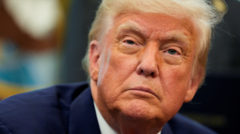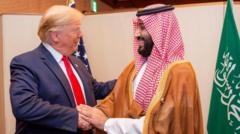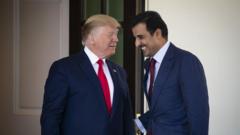Ukrainian President Volodymyr Zelensky's recent response to peace talks offers insights into the evolving dynamics of the conflict.
**Trump's Next Moves on Ukraine: A Pivotal Moment**

**Trump's Next Moves on Ukraine: A Pivotal Moment**
In light of ongoing tensions, Donald Trump's potential actions on the Ukraine conflict are generating significant scrutiny.
---
Ukrainian President Volodymyr Zelensky responded cautiously to Russian President Vladimir Putin's recent offer for direct negotiations in Istanbul next Thursday. While one might have anticipated a staunch rejection from Zelensky, who demanded a 30-day ceasefire from Moscow, his message on social media was surprisingly diplomatic, labeling the Russian overture as a “positive sign” of potential peace efforts.
Zelensky emphasized the importance of Russia officially committing to a ceasefire starting Monday, which raises questions about the sincerity of Putin's proposals. The underlying motivations for both leaders are heavily influenced by their perceptions of U.S. President Donald Trump, whom neither wants to appear as obstructing the path to peace.
Trump's commentary on social media reflected a sense of optimism about the discussions, suggesting, “A potentially great day for Russia and Ukraine!” His comments underscore the pivotal role he may play in shaping the talks, given his previously warm relations with the Russian leader.
The Kremlin's narrative includes demands that Western nations cease military support for Ukraine before any ceasefire can be enforced. This poses a stark challenge for Ukraine, which relies heavily on continued arms supplies to counter Russian advances. Air defense systems are urgently needed to protect major cities from the escalating threat of missile and drone attacks.
In this context, the pivotal question looms: Will Trump view Putin's overtures as mere stalling tactics, or will he opt to support Putin's position, pressuring Ukraine to acquiesce to demands laid forth during the Istanbul talks? As tensions remain high with continuous air raid alerts in Ukraine, the world watches closely in anticipation of Trump's next move on this critical issue.
Ukrainian President Volodymyr Zelensky responded cautiously to Russian President Vladimir Putin's recent offer for direct negotiations in Istanbul next Thursday. While one might have anticipated a staunch rejection from Zelensky, who demanded a 30-day ceasefire from Moscow, his message on social media was surprisingly diplomatic, labeling the Russian overture as a “positive sign” of potential peace efforts.
Zelensky emphasized the importance of Russia officially committing to a ceasefire starting Monday, which raises questions about the sincerity of Putin's proposals. The underlying motivations for both leaders are heavily influenced by their perceptions of U.S. President Donald Trump, whom neither wants to appear as obstructing the path to peace.
Trump's commentary on social media reflected a sense of optimism about the discussions, suggesting, “A potentially great day for Russia and Ukraine!” His comments underscore the pivotal role he may play in shaping the talks, given his previously warm relations with the Russian leader.
The Kremlin's narrative includes demands that Western nations cease military support for Ukraine before any ceasefire can be enforced. This poses a stark challenge for Ukraine, which relies heavily on continued arms supplies to counter Russian advances. Air defense systems are urgently needed to protect major cities from the escalating threat of missile and drone attacks.
In this context, the pivotal question looms: Will Trump view Putin's overtures as mere stalling tactics, or will he opt to support Putin's position, pressuring Ukraine to acquiesce to demands laid forth during the Istanbul talks? As tensions remain high with continuous air raid alerts in Ukraine, the world watches closely in anticipation of Trump's next move on this critical issue.






















